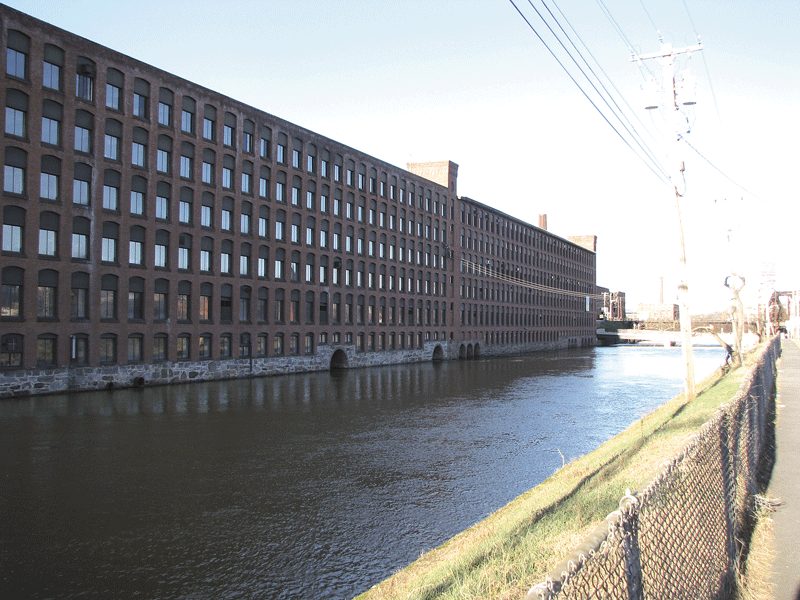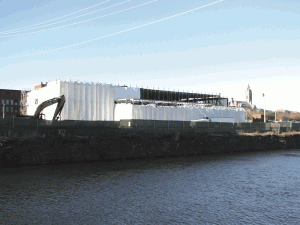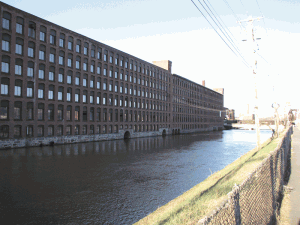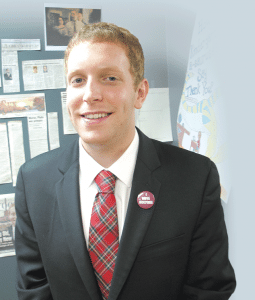
Seizing the Moment
Holyoke’s Young Mayor Is Ready to Get to Work
Alex Morse’s triumph in November’s election captured the attention of the entire region — not to mention those who put together the guest list for a dinner at the White House a few weeks ago. At 22, Morse is said to be second-youngest mayor in the state’s history, but his educational background and seemingly limitless confidence would appear to have him ready for the corner office. He says his primary goals are to aggressively market and rebrand the city, and enable it to take full advantage of what he called “its moment.”Alex Morse graduated from Brown University last spring with a degree in Urban Studies.
This means that he knows a lot more than most people about what prompted the decline of every major Northeast city in the ’50s, ’60s, and ’70s, and also about what some of those same communities have done to reinvent themselves and bring people back downtown.
And at Brown, he had a working laboratory in the form of one of the more intriguing urban comebacks, albeit one that is still very much a work in progress. In Providence, city officials, led by flamboyant and controversial mayor Vincent (Buddy) Cianci, literally moved a river, among other initiatives, in their efforts to reinvigorate a moribund central business district and make their community a destination.
Providence, its downtown, and its public school system became the subjects of many of Morse’s classroom projects in Urban Studies, but his hometown of Holyoke also figured prominently in his coursework; indeed, the recent Hope 6 project in the city’s Churchill neighborhood became the subject of one assignment, and his experiences growing up in a declining urban core gave him a unique perspective for the classroom — in the many forms it took.
“Unlike my classmates in Urban Studies and Political Science, I actually came from a struggling urban community, and could use my perspective from growing up here and going to public schools,” he explained. “A lot of the kids at Brown had gone to private schools and didn’t have the experience that I had; I thought that what I brought to the table was much more relevant than what my classmates had to offer. And at the same time, I could take what I learned at Brown and bring it back to Holyoke.”
And it was while working toward his degree — probably early in his junior year, by his estimation — that Morse boldly decided that he would like to continue his education in urban studies in Holyoke City Hall, specifically the spacious ground-floor mayor’s office.
It was with extreme confidence that Morse entered the race nearly a year ago, and it was this character trait, coupled with a solid game plan, a message of hope, and a positive campaign tone, captured in his lapel pin bearing the words ‘I Love Holyoke,’ that propelled him to victory over incumbent Elaine Pluta on Nov. 1.
In a wide-ranging interview with BusinessWest a few weeks before his inauguration, Morse, whose campaign exploits have made news well outside the 413 area code — at 22, he’s the second-youngest mayor in the state’s history, and he’s already been a guest at the White House — talked at length about his road to the corner office and what he plans to do when he officially takes office.
He said that, while his business card and door plaque will say ‘mayor,’ he considers himself, first and foremost, to be the city’s “chief marketing officer.”
Indeed, he told BusinessWest, while Holyoke has suffered (and continues to suffer) from many of the ailments facing Northeast cities — from high concentrations of poverty in the urban core to a struggling public school system —perhaps its biggest problem is perception and the fact that no one is telling the city’s story, or at least to the right people.
And he believes that, from the perspective of a marketer, or salesperson, he has a quality product to sell.
“Holyoke is a great city, and we’re at a great time,” he explained. “Things are really falling into place in a really great way for our city. And I’m prepared to be Holyoke’s biggest salesperson and spokesperson as mayor, and I think that’s what Holyoke needs, someone willing to stand up and promote our assets.”
Beyond marketing, Morse says his primary assignment is to help make sure that Holyoke takes full advantage of what he called “its moment.”
Elaborating, he said pieces of the recovery puzzle — an emerging creative economy, the possible return of rail service, investments in downtown, the Canal Walk, a growing reputation as a ‘green’ community, the Victory Theatre project, and especially the high-performance computing center and the attention it is generating — are coming together, and Holyoke must seize its opportunity to do something special.
“This is the moment; we have a window of opportunity over the next two years to take advantage of this incredible moment,” he said. “It comes down to what we do with that moment, and this is why I ran for mayor. We can either stay the same and cling to the status quo, or we can embrace the future and do things differently.”
News Flash
One of Morse’s biggest challenges since election night has been handling all the media requests.
They’ve come from far and wide, including the Boston Globe, the Christian Science Monitor (which made him one of its ‘30 under 30’ subjects), New England Cable News, MSNBC, CommonWealth magazine, and the Brown University alumni magazine, among others.
He doesn’t say ‘yes’ to everyone — he’s spending most of his time on transition issues — but there haven’t been many ‘nos’ to date. That’s because he views such press encounters as opportunities — not for him, necessarily, but for Holyoke. He endeavors to take the focus of questioners from himself to the city, and often, the interviews take place while he’s offering a tour of the community to someone who has never seen it or knows little about it (he took the Globe on one just before meeting with BusinessWest).
And he can already see some tangible results from all that press.

The high-performance computing center is one of many projects that Morse believes has “put all eyes on Holyoke.”
Thanks to all that attention from the Fourth Estate before and after the election, many in the region know at least some of the Alex Morse story — that he’s young, openly gay, has had dinner at the White House (he said the invitation just appeared in the mail one day), and isn’t a supporter of a casino as an economic-development strategy. Those who have read a little more thoroughly know that he grew up in the city, attended Peck Middle School and Holyoke High School, where he was salutatorian, and was accepted at the only college he applied to — Brown.
They might also know by now that Morse’s parents have worked mostly blue-collar jobs — his father with Carando (he now has a manager’s position there) and his mother with a day-care facility she ran out of the family home — and that he was the first one in his family to earn a college degree.
He told BusinessWest that his upbringing has provided him a unique perspective on one of the main challenges facing his city and most others like it: narrowing the income gap between the poor and the wealthy, and bolstering the middle class.
“We need people with disposable income in downtown Holyoke,” he explained. “It’s not sustainable to have concentrated poverty in our downtown.”
What most have come to learn about Morse is that running for mayor certainly wasn’t anything spontaneous. Rather, it was a well-thought-out plan, a common-sense career path chosen because of his affection for his hometown, knowledge of urban challenges and models for revitalization, and a desire to bring real change to a city that has long been the butt of jokes.
“The last two years of my life have been pretty much consumed by the campaign,” he explained. “It’s something I’ve thought about for about four years. It didn’t matter exactly who I was running against; I could have been running against Elaine Pluta, I could have been running against another long-term city councilor — there was nothing personal about it, it was just something I wanted to do.”
Morse said his campaign strategy was fairly straightforward, and involved meeting as many residents and business owners as possible, framing everything in the positive — “I focused on my ideas and my plans, and people respected that” — and, in a nutshell, “getting people excited about Holyoke again.”
To say that he succeeded with all that would be an understatement. He won the endorsement of the Republican, a paper with a long and deep record of supporting incumbents, and was swept into office by a 53-47 margin.
And while some have suggested that the election results represent a vote against Pluta, a longtime city councilor elected mayor two years ago, and/or a vote against casinos, Morse certainly doesn’t see it that way.

Morse will soon become a resident of Open Square, seen here from just across the canal, in a move he equates to putting his money where his mouth is.
A Moveable Feast
It’s called BYOR.
That’s short for Bring Your Own Restaurant, a rather unique grassroots initiative started by a group of city residents more than a year ago in response to a perceived lack of dining options in the downtown area.
Participants bring tables, chairs, and potluck dishes to designated spots — empty lots near the canals and the parking area of a closed gas station have worked — that in essence become those nights’ restaurant, said Morse, adding that he’s taken part in several of these get-togethers. He’s hoping, of course, that someday soon this BYOR tradition will end out of necessity — or lack thereof, in this case. And bringing that day closer to reality is just one of many formal and informal items on his list of goals and objectives.
At the top of that list is rebranding the city, or changing the long-held perceptions about it. He’s noticing incremental improvement in the way people talk about his community — he mentioned he’s heard people saying they should move to the city, or move back to it, as the case may be — but maintains that it still has a long way to go.
As chief marketing officer, Morse said he’ll essentially go anywhere and do anything to put Holyoke front and center and sell attributes ranging from cheap, ‘green’ energy to housing prices well below those in surrounding cities.
“We have a great foundation here — it’s not as if we have to start over,” he told BusinessWest. “We just have to restore it to what it once was and beyond that. During the campaign, I talked about bringing us from the Paper City to the Digital City, and I’m going to be the one to lead us into the future — and a better future.”
Rebranding is something he believes Providence did quite well, and its success in that realm is just one component of a broad revitalization strategy he would like to make one of many models Holyoke can borrow from in the years ahead.
Another was the partnerships forged with the business community, he went on, as well as the desire to take bold and dramatic steps, such as reclaiming the Providence River, once spanned by the ‘world’s widest bridge’ (1.5 miles) as recorded in the Guinness Book of World Records, and making it a true asset through initiatives such as the famed WaterFire installation.
“There’s a lot of good things happening in Providence in terms of what they’ve done to rebrand themselves,” he said. “Some of the reflections and experiences I’ve had in Providence will help inform what I want to do in Holyoke in terms of perception and the way Providence has used the artists’ community in the downtown, restaurants, how they’ve taken advantage of the river with WaterFire, and how they’re bringing people into downtown.
“They had some very concerted efforts on the part of the municipal government, and what they did well was partner with business,” he continued. “There were a lot of public-private partnerships to get investment back in Providence.”
Morse said he and his classmates at Brown studied a number of communities, including Baltimore, Detroit, Boston, and others, and that there are common denominators and lessons to be taken from many models for recovery.
“Holyoke is unique in many senses and special in many senses, but at the same time, we have followed the same trajectory as many Northeast and Midwestern cities in terms of deindustrialization and the moving of factories to the south and then overseas; Holyoke is just a part of that story,” he explained.
“Any urban community struggles with issues like public education; it’s how we respond to them that’s really going to make a difference,” he continued. “What I’m interested in as mayor is looking at what other mayors are doing, looking at what other school systems are doing, looking at best practices, and learning from what’s worked and what hasn’t worked.”
Live and Learn
Morse said much of his administration’s focus and energy will be directed toward the downtown area, where efforts will be concentrated on seizing momentum from the computing center, while also working on the many aspects involved with getting more people living in that area.
And the new mayor won’t just be talking about it — he’ll be doing it.
Indeed, he will be the first residential tenant in Open Square, the massive former mill complex now home to dozens of businesses, a café, a performing-arts group, and more, and is awaiting final touches on the space before moving in later this month.
“I made a statement that I wanted to move downtown to help change the perception there,” he told BusinessWest. “If I show a business owner our downtown or Open Square, or talk to young families about moving here, I can say, ‘hey, the mayor lives right down the street; it must be safe.’
“It’s a symbolic gesture, but I’m putting my money where my mouth is,” he continued. “Anything we can do to promote downtown and bring more people and more business there … I think that will help us.”
Overall, Morse says he sees a good deal of momentum downtown, and it comes in a number of forms — from the attendance at the regular BYOR events to growing interest in commercial property in that area, to a growing sense of community, coupled with changing demographics, that he believes are a very positive sign.
“There’s a community today that didn’t exist 10 years ago in Holyoke — a progressive, young, arts-friendly constituency here in downtown,” he explained. “There’s an interest in downtown moreso than I’ve ever seen before, and that’s very refreshing to me, someone who was born and raised here; it’s great to see interest from people who weren’t born here but want to move here and have things happen downtown.”
From his studies of other cities, Morse said he fully understands the chicken-and-egg scenario when it comes to growing the population in the urban core; professionals, empty nesters, and others with disposable income need good reasons to move to a downtown — safe streets, attractive housing, and nightlife are all high on the list — but many of those things, and especially the nightlife part, won’t happen unless there is already a critical mass of urban dwellers capable of supporting businesses.
“If we want to support a thriving small-business community — restaurants, cafés, and nightclubs — we need to have people with money in their pockets,” he explained. “And that means we have to convince people to move to Holyoke, bring their business here, and be a part of this.
“A lot of young professionals and even single people, men and women, want to live in urban communities; I’m convinced of that,” he continued. “Over the past 50 years, there’s been a lot of disinvestment in cities, as if cities were bad, but now, attitudes are changing, and we need to take advantage of that.”
Forward Thinking
When asked what someone ambitious enough to run for mayor of a major city while still a college student might do next for a career challenge, Morse smiled broadly and paused for a minute.
While he didn’t speculate on what else he might do, he mentioned Thomas Menino, the longest-serving mayor in Boston’s history (18 years) and hinted that this is a record of service he may try to emulate.
“Holyoke needs consistent leadership over the next decade,” he said, hinting that he plans to be around at least that long — if the voters are so inclined.
For now, though, he’s focused on getting on with his work as chief marketing officer and with enabling Holyoke to take advantage of that window of opportunity he mentioned.
He said he’s never seen people this excited about the city, and that he considers it his job to capture that excitement and have it translate it into tangible, positive change. He acknowledged that he certainly can’t change the citiy’s fortunes in two years, but he can certainly get the ball rolling.
And if he does, he might be back in the White House soon.
George O’Brien can be reached at [email protected]






